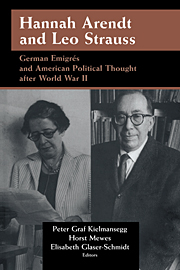Book contents
- Frontmatter
- Introduction
- PART I HANNAH ARENDT
- 1 Hannah Arendt and the Theory of Democracy: A Critical Reconstruction
- 2 The Questionable Influence of Arendt (and Strauss)
- 3 Hannah Arendt: A German-American Jewess Views the United States - and Looks Back to Germany
- PART II LEO STRAUSS
- PART III ROUNDTABLE DISCUSSION
- Select Bibliography of Works by Arendt and by Strauss on Modern Political Science and Philosophy
- Index
1 - Hannah Arendt and the Theory of Democracy: A Critical Reconstruction
Published online by Cambridge University Press: 05 January 2013
- Frontmatter
- Introduction
- PART I HANNAH ARENDT
- 1 Hannah Arendt and the Theory of Democracy: A Critical Reconstruction
- 2 The Questionable Influence of Arendt (and Strauss)
- 3 Hannah Arendt: A German-American Jewess Views the United States - and Looks Back to Germany
- PART II LEO STRAUSS
- PART III ROUNDTABLE DISCUSSION
- Select Bibliography of Works by Arendt and by Strauss on Modern Political Science and Philosophy
- Index
Summary
introduction
On Revolution is Hannah Arendt's major contribution to political theory, and although the book's potential as a source of a theory of democracy is not immediately apparent, it is not necessary to dig very far to unearth the treasures this work contains. Arendt's notion of the secular foundation of political authority and of communicative power as well as her concepts of “public freedom” and the “founding act” have since been adopted as the standard components of numerous theories of democracy that are based on a philosophical approach. Yet it is true that the book's potential does not speak to theories oriented toward current issues. There are two reasons for this.
First, the parts of her work that can be related to systematic questions of a theory of democracy are mainly clad in the guise of a comparative reconstruction of the conceptual worlds of men who lived during and reflected upon the American and French revolutions. In other words, the reader is constantly forced to take the trouble of extracting a systematic political theory from a superbly presented history of ideas. The second reason why On Revolutions potential for a theory of democracy is not immediately apparent is Arendt's idealization of the founding of the North American confederation, which she treats as though it represented a historical realization of the Utopian democratic republic.
- Type
- Chapter
- Information
- Hannah Arendt and Leo StraussGerman Émigrés and American Political Thought after World War II, pp. 11 - 28Publisher: Cambridge University PressPrint publication year: 1995
- 1
- Cited by

